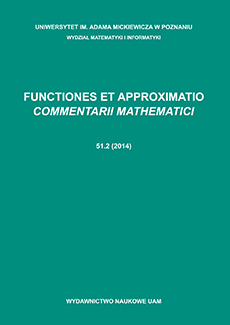Abstract
For positive integers $\alpha_{1}, \alpha_{2}, \ldots, \alpha_{r}$ with $\alpha_{r} \geq 2$, the multiple zeta value or $r$-fold Euler sum is defined by \[\zeta(\alpha_{1}, \alpha_{2}, \ldots, \alpha_{r}) = \sum_{1\leq n_{1}<n_{2}<\cdots<n_{r}}n_1^{-\alpha_1}n_2^{-\alpha_2}\cdots n_r^{-\alpha_r}. \] where $|\alpha|=\alpha_1+\alpha_2+\cdots+\alpha_r$ and $r$ are the weight and depth of $\zeta(\alpha_{1}, \alpha_{2}, \ldots, \alpha_{r})$ respectively. By the general theorem given in [11], the multiple zeta value $\zeta(\alpha_{1}, \alpha_{2}, \ldots, \alpha_{r})$ can be expressed as a rational linear combination of products of multiple zeta values of lower depth if its depth and weight are of different parity. In other words, when the sum of its depth and weight is odd. However, there are still some exceptions for quadruple Euler sums. As conjectured in [6], a quadruple Euler sum with even weight exceeding 14 can be expressed as a rational linear combination of products of multiple zeta values of depth 1, 2 and 3 if and only if it is one of the following forms: $\zeta(1,a,b,a)$, $\zeta(b,1,a,a)$, $\zeta(b,b,1,a)$ or $\zeta(a,b,b,a)$ with $a=b$ or $b=1$. In this paper, we shall evaluate these quadruple Euler sums of even weight by the identities among multiple zeta values with variables and relation obtained from the stuffle formula of two multiple zeta values.
Citation
Minking Eie. Chuan-Sheng Wei. "Evaluations of some quadruple Euler sums of even weight." Funct. Approx. Comment. Math. 46 (1) 63 - 77, March 2012. https://doi.org/10.7169/facm/2012.46.1.5
Information





